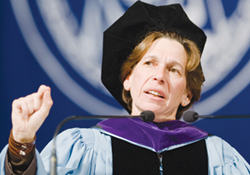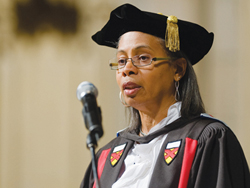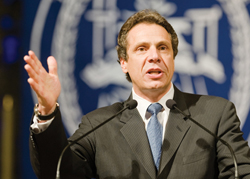CONVOCATION 2008
Partnering to Change the World
Partnership was the theme of TC’s 2008 convocation ceremonies in May for more than 1,900 master’s and doctoral degree students hailing from 57 nations and 38 American states as well as the
Despite their diversity of origin and interests, TC President Susan Fuhrman told the graduates, “you all came to TC because you wanted to engage the world and even more important, because you wanted to change it.” That desire, she said, is rooted in a view of partnership that began with John Dewey, who wrote that, “The learning in school should be continuous with that out of school. There should be a free interplay between the two. This is possible only when there are numerous points of contact between the social interests of the one and the other.”
Fuhrman illustrated her premise with the stories of a handful of those receiving their degrees.
Patricia Lopez, who received her master’s in Health Education, is an Argentine-born single mother who focused on preventive health care after losing her mother and two aunts to cancer. Joe King, graduating with a Master of Science in education from TC’s clinical psychology program, served as Vice President of the Student Senate, interned in Washington, D.C., co-authored a chapter in a faculty member’s book and kept a regular blog on the TC Web site—all despite being wheelchair-bound due to brittle bone disease. And Ted Kesler, now an assistant professor in the CUNY system, was previously an elementary school teacher who, in 1996, became the focus of a 10-part New York Times series as he prepared his students to take the City’s first high-stakes promotion test for third graders.
“For Ted, who had taken a course with [TC Professor Emeritus] Tom Sobol on ‘defining moments’ it was definitely a defining moment,” Fuhrman said of Kesler’s ordeal. “It left him convinced that as a teacher, his job was to protect kids from the demands of the tests and to proceed with inquiry, engagement and everything you believe really connects with kids’ lives and motivates them to learn.”
New York State Attorney General Andrew Cuomo elaborated on that theme, calling on the nation to deliver on its historic promise that “you could go to school and become whatever you wanted to be.” Cuomo accepted the College’s Medal for Distinguished Service on behalf of the state’s governor, David A. Paterson, who was unable to attend due to illness.
And at the evening master’s ceremony, medalist Randi Weingarten, President of the United Federation of Teachers (and since elected President of the American Federation of Teachers, the profession’s national union), pointed out that Dewey also helped found the former organization. That fact, she said, is a reminder to her that, “the core for me, as for you, is about teaching and learning. Everything else is just a part of how you create an environment that enables teachers to be the best they can be and students to open the doorway of life.”
The third medalist, Gloria Ladson-Billings, Kellner Family Professor in Urban Education at the University of Wisconsin-Madison, called for the graduates to engage in “public scholarship,” which she described as being “less the university and its faculty going outside the ivory tower to solve ‘community problems’ and more the cultivation of norms of reciprocity and mutuality that place communities and universities on more equal footing.”
Ladson-Billings, who spoke in fall 2007 at a TC launch event for the College’s “Teaching The Levees” curriculum, which explores civic issues raised by Hurricane Katrina and its aftermath, cited
“The shame of
Published Thursday, Jan. 15, 2009



